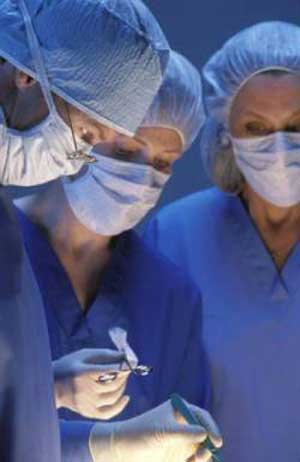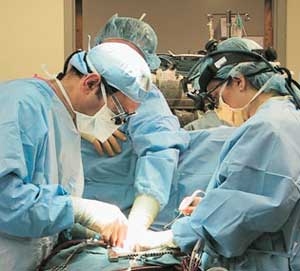Surgeon
Tasks & duties

Surgeons may do some or all of the following:
-
read reports of patients' health
-
examine patients and decide whether operations are needed
-
consult with other medical professionals about patient care
-
consult with anaesthetists about the operation and the patient's treatment
-
give instructions about preparing patients for operating theatres
-
work out the best way to operate
-
perform and manage operations
-
instruct and manage what care is to be given after an operation by nursing and medical staff
-
check the progress of patients in hospital
-
keep medical records and send final reports to general practitioners
-
provide follow-up care for patients who have been discharged from hospital
-
teach medical students and trainee surgeons
-
carry out research
Specialisations
Surgeons can specialise in the following areas:
Cardiothoracic Surgeon
Cardiothoracic surgeons treat diseases of the heart, lungs and chest wall.
General Surgeon
General surgeons treat diseases of the abdomen, breast and endocrine (glandular) organs.
Neurological Surgeon
Neurological surgeons treat diseases of the brain and nervous system.
Ophthalmologist
Ophthalmologists treat diseases of the eye.
Orthopaedic Surgeon
Orthopaedic surgeons treat diseases of the bones, joints, muscles and soft tissue.
Otolaryngologist
Otolaryngologists treat diseases of the ear, nose and throat.
Paediatric Surgeon
Paediatric surgeons treat a wide range of diseases in children.
Plastic or Reconstructive Surgeon
Plastic or reconstructive surgeons repair, restore, or improve lost, injured, defective, or deformed body parts.
Vascular Surgeon
Vascular surgeons treat diseases of blood vessels, including veins, arteries and lymphatics.
Skills & knowledge

Surgeons need to have:
-
knowledge of anatomy and how the human body works
-
knowledge of surgical methods
-
knowledge of different diseases and illnesses
-
knowledge of medicines and treatments and the effect these have on patients
-
diagnostic skills
-
up-to-date knowledge of new research, treatments and practices
-
knowledge of medical ethics and law
-
communication and people skills to relate well to patients and colleagues
-
decision-making and problem-solving skills
-
organisational and time management skills
-
analytical and interpreting skills
-
report writing skills
-
an awareness and understanding of other cultures and their attitudes to surgical treatment
Surgeons need to have some knowledge of other medical specialities such as oncology, radiology and pathology. Those who own their own practice also need business skills.
Entry requirements
To become a surgeon you need to complete a Bachelor of Medicine and Bachelor of Surgery (MBChB) and spend at least two years as a junior house surgeon in a hospital before applying for basic surgical training. After two to three years' basic training, you then enter advanced surgical training in a specialisation – this takes four to six years.
Secondary education
A tertiary entrance qualification is required to enter further training. Useful subjects include Bursary or NCEA equivalent maths, chemistry, physics, biology and English.
Training on the job
Surgeons learn surgical skills on the job and through attending surgical skills laboratories where they learn on synthetic materials. Surgeons are required to continue training throughout their careers, attending seminars and courses such as those run through the Royal Australasian College of Surgeons. Courses on new surgical procedures and techniques are also available through medical schools.
Registration
Surgeons need to be a Fellow of the Royal Australasian College of Surgeons (RACS) or hold an equivalent overseas fellowship or registration approved by the Medical Council of New Zealand to enable them to have vocational registration (essential for all surgical specialists).
Useful Experience
Useful experience for surgeons includes:
-
medical research work (with an emphasis on surgery)
-
any work in the health sector
-
any degree with some chemistry and biology content
-
any work dealing with people from a cross-section of society
Related courses
Medical Science
Surgery
For more information, please refer to Career Services.
Document Actions
